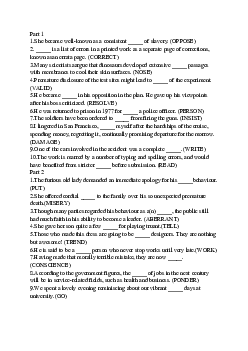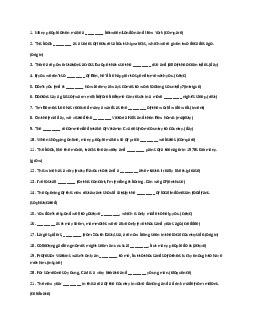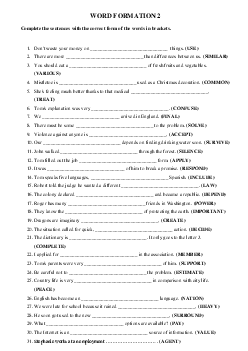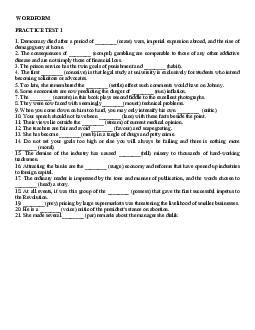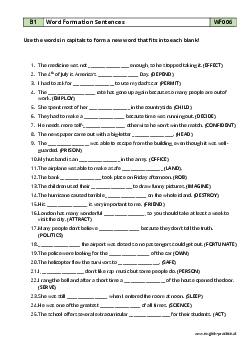







































Preview text:
ENGLISH LANGUAGE I MODULE 2: MODAL VERBS Explanations
Don't have to and
• Don't have to refers to an absence of obligation. must not
You don't have to work tomorrow.
• Must not refers to an obligation not to do something.
You must not leave the room before the end of the test. Should
Where *should appears, ought to can also be used. • Expectation
This film *should be really good. • Recommendation
I think you *should talk it over with your parents.
In writing, should can be used to express a strong obligation politely.
Guests should vacate their rooms by midday. • Criticism of an action
You *shouldn't eat so much late at night. • Uncertainty
Should I leave these papers on your desk?
• Should and verbs of thinking
Should is often used with verbs of thinking, to make an opinion less direct.
I should think that model would sell quite well.
• With be and adjectives describing chance
This group of adjectives includes odd, strange, funny (=odd) and the expression What a coincidence.
It's strange that you should be staying in the same hotel!
• After in case to emphasise unlikelihood
I'm taking an umbrella in case it should rain.
See Grammar 8 for similar uses in conditional sentences.
• Could is used to express possibility or uncertainty. Could
This could be the house.
• Could is used with comparative adjectives to express possibility or impossibility.
The situation couldn't be worse.
It could be better. 65 2
A D V A N C E D L A N G U A G E P R A C T I C E
• Could is used to make suggestions.
We could go to that new restaurant opposite the cinema.
• Could is used to express unwillingness.
/ couldn't possibly leave Tim here on his own. Can
• Can with be is used to make criticisms.
You can be really annoying, you know!
• Can is also used with be to refer to capability.
Winter here can be really cold. Must and can't
These refer to present time only. (See bound to). In expressing certainty, they are opposites.
This must be our stop. (I'm sure it is.)
This can't be our stop. (I'm sure it isn't.)
May and might
• May can be used to express although clauses:
She may be the boss, but that is no excuse for shouting like that. See also Grammar 14 Emphasis. • May/might as well
This describes the only thing left to do, something which the speaker is not enthusiastic about.
Nobody else is going to turn up now for the lesson, so you may as well go home.
• May and might both express possibility or uncertainty. May is more common in formal language.
The peace conference may find a solution to the problem.
• There is an idiomatic expression with try, using may for present reference,
and might for past reference.
Try as I might, I could not pass my driving test.
(This means although I tried hard, I could not pass my driving test.) Shall
• Shall can be used with all persons to emphasise something which the speaker
feels is certain to happen or wants to happen.
/ shall definitely give up smoking this year.
We shall win! (shall is stressed in this sentence)
• Similarly, shall is used in formal rules and regulations.
No player shall knowingly pick up or move the ball of another player. Will
• Will can be used to express an assumption.
A: The phone's ringing. B: That'll be for me. 66 3
G R A M M A R 1 1 M O D A L S : P R E S E N T A N D F U T U R E
• Will/won't can be used emphatically to tell someone of the speaker's
intention, or to forbid an action, in response to a will expression.
/'// take the money anyway, so there! You won't! I will!
Similarly / won't can mean / refuse, and / will can mean / insist.
A: I won't do it! B: Yes, you will! Would
Would is often used in situations where a conditional sense is understood but not stated.
Nobody would agree with that idea, (if we asked them)
Life wouldn't be worth living without you. (if you weren't there)
/ think Jim would be the best candidate, (if he was under consideration for the job)
Sue wouldn't do that, surely! (if you think she's capable of doing that). Need
• Need to is a modal auxiliary, and behaves like a normal verb.
Do you need to use the photocopier?
• Need is a modal auxiliary, but mainly in question and negative forms.
Need you make so much noise?
See Grammar 7 for need doing Related • Had better non-modal
This is a recommendation and refers only to the present or future. expressions
You'd better not phone her again. • Be bound to
This makes a future prediction of certainty.
It's bound to rain tomorrow. 67 4
A D V A N C E D L A N G U A G E P R A C T I C E
1 Underline the correct word or phrase in each sentence.
a) I don't think you could/should tell anyone yet.
b) I couldn't/shouldn't possibly leave without paying.
c) That mustn't/can't be the hotel Jane told us about.
d) There are times when the traffic here can/could be really heavy.
e) We are enjoying our holiday, though the weather could/must be better.
f) You couldn't/shouldn't really be sitting here.
g) You could/may be older than me, but that doesn't mean you're cleverer,
h) You might/should like to look over these papers if you have time.
i) I'm afraid that nobody should/would help me in that kind of situation,
j) No member of the association must/shall remove official documents from
these premises without written permission.
2 Put one suitable word in each space. Contractions (can't) count as one word. Bill: This (1)
be the house, I suppose, number 16 Elland Way.
Jane: I pictured it as being much bigger, from the estate agent's description.
Bill: Well, we'd (2) go inside.
Jane: We (3) as well. Wait a minute. I (4) to just
find my glasses. I (5) see a thing without them.
Bill: I don't think much of it from the outside, to be honest.
Jane: Yes, it (6) certainly do with a coat of paint or two.
Bill: Rather you than me! I (7) like to have to paint it all! And the gutters (8) replacing.
Jane: I (9) think they haven't been replaced since the house was built.
Bill: They (10) really be replaced every four years ideally.
Jane: And I don't like that big ivy plant growing up the side. Ivy
(11) get in the brickwork and cause all sorts of damage.
Bill: I wonder if there's a lock on that big downstairs window? It looks very easy to break in to.
Jane: There's (12) to be one, surely. Bill: Well, (13) we go inside?
Jane: Do we (14) to? I think I've seen enough already. I (15) possibly live here. 68 5
G R A M M A R 1 1 M O D A L S : P R E S E N T A N D F U T U R E
3 Complete the second sentence so that it has a similar meaning to the first
sentence, using the word given. Do not change the word given.
a) I couldn't be happier at the moment. could I am as at the moment.
b) Although I tried hard, I couldn't lift the suitcase. might
Try , I couldn't lift the suitcase.
c) I'm sure that Peter won't be late. bound Peter on time.
d) Fancy you and I having the same surname! should It's odd the same surname!
e) I think you should take up jogging. were If I take up jogging.
f) It's possible that this kind of snake is poisonous. could
This snake the poisonous kinds. g) You can't borrow my car! won't I borrow my car!
h) I'm sure this isn't how you get to Norwich! can't This way to Norwich!
i) It makes no difference to me if we call it off. may We call it off.
j) Although it's summer, the temperature is more like winter. may
It the temperature is more like winter. 69 6
A D V A N C E D L A N G U A G E P R A C T I C E
4 Choose the sentence A or B that is closest in meaning to the sentence given.
a) It's possible that we'll know the answers tomorrow. ...A.,...
A We may know the answers tomorrow.
B We should know the answers tomorrow.
b) I don't think you should ring him now. It's rather late
A You might not ring him now. It's rather late.
B You'd better not ring him now. It's rather late.
c) You needn't come if you don't want to
A You won't come if you don't want to.
B You don't have to come if you don't want to.
d) I think it's wrong for you to work so hard
A You don't have to work so hard. B You shouldn't work so hard. e) Perhaps these are the keys A These might be the keys. B These must be the keys.
f) It would be wrong for us to lock the cat in the house for a week
A We'd better not lock the cat in the house for a week.
B We can't lock the cat in the house for a week,
g) Ifs possible that the decision will be announced next week
A The decision might be announced next week.
B The decision will be announced next week,
h) Although I try hard, I can never solve The Times' crossword
A Try as I may, I can never solve 'The Times' crossword.
B Try as I can, I may never solve 'The Times' crossword.
i) I know. Why don't we go out to eat instead?
A I know. We must go out to eat instead.
B I know. We could go out to eat instead. 70 7
G R A M M A R 1 1 M O D A L S : P R E S E N T A N D F U T U R E
5 Complete each sentence with one of the phrases from the box.
a) The heating comes on automatically. You turn it on.
b) Of course I'll help! I let you do it on your own.
c) It's a lovely hotel. And the staff more helpful.
d) George it there if he has stayed there for so long.
e) You right, but I'm still not convinced.
f) We go in this museum. There's nothing else to do.
g) I love these trees. Without them the garden the same.
h) There's the phone call I was expecting. It George.
i) Thanks. And now you just sign on the dotted line.
j) Try as , I simply couldn't open the lid.
6 In most lines of this text there is an extra word. Write the word, or put a tick if the line is correct.
I may as well be admit it - I'm a secret admirer of all things connected 1 ...be
with trains! It's not with something you would want to admit to your 2
friends, but I can't imagine life possibly without my collection of model 3
trains and train memorabilia. You're probably thinking I must be done 4
some kind of nerd who stands around on chilly platforms all day 5
collecting train numbers, and yes, I have to admit for I've done my fair 6
share of that, but that's only a small part of it. I can just love the feel of 7
railway stations, and I can cheerfully spend a whole of afternoon in 8
one, just walking around soaking up to the atmosphere of the place, 9
looking for things for my collection, and taking photos of new engines. 10
Call me might a wierdo, but I'd far rather spend a day in a station 11
than on the beach by sunning myself. I'd be too busy taking the train 12
down the coast - coastal routes can be an absolutely spectacular. 13
There's a convention for those railway lovers on the south coast soon 14
- rest assured that I shall be there. I wouldn't miss it for all the world! 15 ... 71 8 Explanations
Had to and must
Had to is the past form of must and refers to a past obligation. have
Sorry I'm late, I had to post some letters.
The negative form is didn't have to and refers to an absence of obligation.
Must have refers to past certainty, (see below)
Should have and
Where *should appears, ought to is also possible. ought to have • Expectation
Should have refers to something which was supposed to happen.
The parcel I sent you *should have arrived by now. • Criticism of an action
You *shouldn't have eaten so much last night.
• Should have and verbs of thinking
The past form knew in the example is an unreal verb form, and the should
have form is used according to 'sequence of verb forms'. See Grammar 9.
/ should have thought you knew.
• With be and adjectives describing chance
It was strange that you should have been staying in the same hotel last year.
• As a polite expression of thanks on receiving a gift or a favour
I've done the washing up for you. - Oh, you really shouldn't have!
The intonation should be friendly, as this is not a criticism. Could have
• Could have refers to past possibility or uncertainty.
David could have won the race if he had tried, (possibility/ability)
It could have been Sue, I suppose, (uncertainty)
• Couldn't have is also possible for both meanings.
• Couldn't have can be used with comparative adjectives.
We couldn't have been happier in those days.
• Could have can also express unwillingness.
She could have gone to the party with her friends, (but she didn't)
We couldn't have left the dog on its own. (so we didn't) Could
• Could refers to past permission or past ability.
When I was sixteen I could stay out till 11.00. (I was allowed to)
Mary could swim when she was three, (she actually did) • Compare:
Mary could have swum when she was three, (but she didn't) 72 9
G R A M M A R 1 2 M O D A L S : P A S T
May have and
• Might have refers to past possibility which did not happen. might have
You might have drowned!
• Might have and may have refer to uncertainty.
/ suppose I may have been rather critical.
• Both can be used in the negative to express uncertainty.
They might not have received our letter yet.
• Might have is used to express annoyance at someone's failure to do
something. There is strong stress on the words underlined.
You might have told me my trousers were split!
• / might have known + would is an idiom by which the speaker expresses
ironically that an action was typical of someone else.
/ might have known that he would be late.
A: It was Jack who broke the vase. B: / might have known!
Must have and
• These refer to the speaker's certainty about a past action. can't have
Someone must have taken it. (I am sure they did)
You can't have lost it. (I am sure you didn't)
• Both can also be used with surely in exclamations.
Surely you can't have eaten all of it!
Surely you must have noticed it! Would not
• This expresses an unwillingness in the past.
Everyone was angry because Sam wouldn't turn off the television. Would have
• Would have can refer to events in the past which did not actually happen.
/ would have accepted this job, but I didn't want to move house.
• Assumptions about the past are also possible with would have.
A: Someone called after you left but didn't leave a message.
B: That would have been Cathy, probably. Needn't have and
Needn't have done refers to an unnecessary action which was actually done. didn't need to
You needn't have paid all at once, (you did pay)
Didn't need to refers to an unnecessary action which was not done.
/ didn't need to go to the dentist again, luckily. Adverbs and
Adverbs such as well, easily, obviously, really, just are often used to emphasise modals
modal expressions, in both present and past time.
You could easily have been killed.
I might well decide to come.
She obviously must have left.
You couldn't really have managed without me.
I might just take you up on that. 73 10
A D V A N C E D L A N G U A G E P R A C T I C E
1 Underline the correct word or phrase in each sentence.
a) That can't have been/shouldn't have been Nick that you saw.
b) You must have given/might have given me a hand!
c) I caught a later train because I had to see/must have seen a client.
d) I suppose Bill should have lost/might have lost his way.
e) I didn't refuse the cake, as it should have been/would have been rude.
f) I don't know who rang, but it could have been/must have been Jim.
g) It was odd that you should have bought/would have bought the same car.
h) I asked them to leave but they might not/wouldn't go.
i) It's a pity you didn't ask because I can't help/could have helped you.
j) It's your own fault, you can't have/shouldn't have gone to bed so late.
2 Complete each sentence using one of the phrases from the box.
a) You and your big mouth! It was supposed to be a secret. You told her!
b) The plane is late. It landed by now.
c) You met my brother. I haven't got one!
d) There is only one explanation. You left your keys on the bus.
e) You heard me right. I definitely said 204525.
f) The meat is a bit burnt. You cooked it for so long.
g) I'm sorry. I accept I been a little bit rude.
h) You really taken so much trouble over me.
i) Was it really necessary? You tell the police, you know,
j) Keep your fingers crossed! The traffic warden
noticed the car's parking ticket has run out! 74 11
G R A M M A R 1 2 M O D A L S : P A S T
3 Complete the second sentence so that it has a similar meaning to the first
sentence, using the word given. Do not change the word given.
a) It wouldn't have been right to leave you to do all the work on your own. couldn't all the work on your own.
b) Perhaps they didn't notice the tyre was flat. might They the tyre was flat.
c) All that trouble I went to wasn't necessary in the end. needn't I all that trouble.
d) Apparently someone has borrowed the cassette player. have Someone the cassette player.
e) I'm disappointed that you didn't back me up! might You me up!
f) Our worrying so much was a waste of time. needn't We so much.
g) It's just not possible for the cat to have opened the fridge. possibly The cat the fridge.
h) It would have been possible for Helen to take us in her car. could Helen us a lift.
i) It's possible that the last person to leave didn't lock the door. might
The last person the door unlocked.
j) School uniform wasn't compulsory at my school. wear
We school uniform at my school. 75 12
A D V A N C E D L A N G U A G E P R A C T I C E
4 Complete each sentence by writing one word in each space. Contractions (can't) count as one word. a) I
have become a millionaire, but I decided not to.
b) You have been here when Helen told the boss not to be so lazy! It was great!
c) Peter wasn't here then, so he have broken your vase.
d) I have bought that car, but I decided to look at a few others.
e) If you felt lonely, you have given me a ring.
f) Don't take a risk like that again! We have lost because of you.
g) It's been more than a week! You have had some news by now!
h) We were glad to help. We have just stood by and done nothing.
i) You really have gone to so much trouble!
j) I have thought that it was rather difficult.
5 Correct any errors in these sentences. Some sentences are correct.
a) Surely you mustn't have forgotten already!
b) Even Paul couldn't have foreseen what was coming next ..................
c) Frances might not have understood what you said ..................
d) It was funny that she should have remembered me ..................
e) Harry may have won the match with a bit more effort ..................
f) You must have told me you had already eaten ..................
g) Look, there's £30 in my wallet. I shouldn't have gone to the bank after all.
h) You mustn't have been so unkind!
i) I couldn't have managed without you
j) I have no idea who it was, but I suppose it would have been Ann
6 Underline the most suitable adverb for each space.
a) Someone obviously/currently/fortunately must have picked it up by mistake.
b) He could really/cheerfully/easily have stolen the painting without anyone knowing.
c) I may surely/well/dearly have made a mistake.
d) You really/clearly/needlessly shouldn't have spent so much on my present.
e) Bill rarely/simply/certainly wouldn't listen to anything we said.
f) I couldn't just/yet/already have left without saying a word.
g) Certainly/Rarely/Surely you can't seriously believe that I am guilty!
h) I opened the window, I greatly/surely/simply had to get some fresh air.
i) I still/unfortunately'/surely couldn't have come to your party,
j) How dangerous! You could still/strongly/well have been injured! 13
G R A M M A R 1 2 M O D A L S : P A S T
7 Complete each space in the text with an appropriate modal verb. Some are negative. Dear Toshie,
Thanks for sending back the book I lent you. You (1) read
it already! You must be the world's fastest reader! Hope you enjoyed it.
Well, the big news is, I decided not to go to Italy to take up my job offer.
Basically, moving there (2) meant a lot of upheaval
and frankly I couldn't face the hassle. Maybe I (3)
just gone, and been a bit more adventurous, and for sure, I've got mixed
feelings about it, as if part of me wanted to go. Who knows, I
(4) met the man of my dreams! But I didn't take
the decision lightly. I (5) spent several weeks
thinking about nothing else. Anyway, what's done is done.
My other news concerns my Dad. You remember I was getting very worried
because he'd been having dizzy spells and feeling all light-headed. Well, I
(6) worried - he's been diagnosed as suffering from
low blood pressure, so he's on medication for that. The doctor said it's possible
that his vegetarian diet (7) set it off. It's a pity you
weren't here! You (8) been able to help Dad, with
your interest in holistic medicine. You (9) given
him some of your aromatherapy treatments.
Anyway, hope to see you again before too long. By the way, guess who's getting
married in June? Brenda! I (10) known it would be
her! It's typical; that girl has all the luck! Bye! Love from, Sue 77 14 15 16 17 18 19 20 21 22 23 24 25 26 27 28 29 30 31 32 33 34 35 36 37 38 39 40
